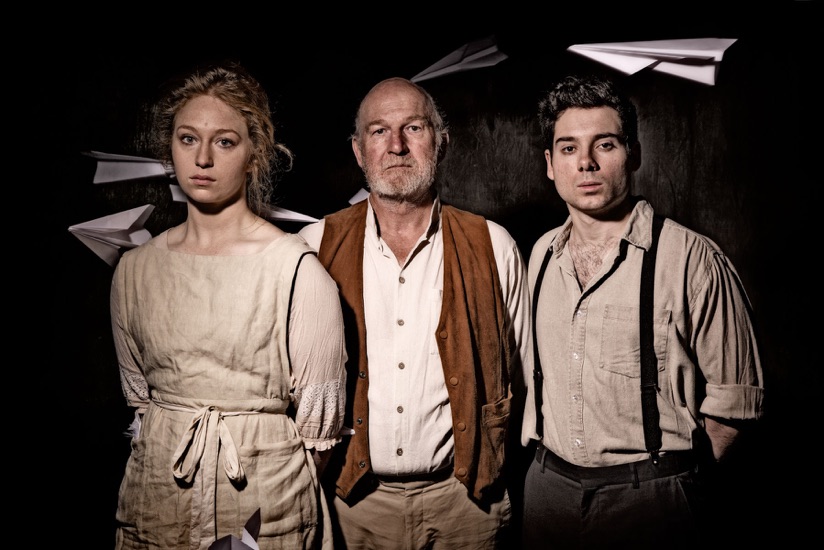Fourteen days ago, productions of two of my plays were cancelled as theatres across the country began to close - productions on track to be astute, nuanced and beautiful. Two days later, on top of these lost opportunities and royalties, I lost my day job and my regular income, registered an intention to apply for Centrelink payments, and burst into tears.
Knowing that this course of events was not caused by me or my collaborators, but by the COVID-19 pandemic that is impacting the lives and livelihoods of millions, softened these personal blows somewhat. But with the rug suddenly pulled out from under me, I prat-fell to the floor, and succumbed to a deep exhaustion that I thought I’d probably sleep off within a few days.
However, as this morning’s dream of the incompetent mentor filtered into my day, I understood why I’ve been so out of sync and useless and lost; why, in my first two weeks of COVID-19 induced isolation, I’ve been incapable of turning this sudden time-bonanza into a productive period of writing and reading and planning that is finely balanced with yoga and meditation, long baths and slow-cooking, and deep deep rest.
In a body that feels sore and ancient, I’ve been walking around as if underwater. None of my usual routines and rituals are working to support and structure my day. Despite unlimited and unencumbered time, I can’t get organised, I can’t set goals, I can’t activate my Isolation Action Plan (everything from writing projects to a wardrobe overall and stepped up activism). I’ve hardly set foot in my bird-attracting, clifftop office where, only two weeks ago, I was writing like the wind. My works-in-progress haven’t been touched. Why can’t I think or be effective? Where the hell is my brain and motivation?
My dream had the answer. Like the incompetent mentor, I’d become dissociated. Simply becoming aware of this involuntary reaction, just trying to describe its peculiar paralysis in this blog, is already reducing its power to run the show.
For two weeks, with all honesty, I was telling people that I was okay. After all, I have safe and secure housing, savings to draw on, and am likely to get the JobKeeper payment. I’ve had gifts of gin, and gourmet care packages, left on my doorstep, and multiple offers of financial assistance should I ever need it. I have friendship everywhere I turn, and connection on tap: phone and video calls, zoom book clubs and dinner parties, and online creative gatherings. I am blessed, and loved, and looked after. So what’s been going on? Why has my organism gone into lockdown?
Because the shocks didn’t stop with my cancelled shows, vanished income, and pride-bruising need to apply for benefits. Then came the devastation of my beloved arts community, firstly by venue closures and program cancellations, and secondly by Friday’s Australia Council four-year operational funding cull of the small-to-medium sector - structural inequity-in-action which continues to throw much of a generation’s cultural labour to the wolves, especially in the areas playwriting and youth arts. Then came Tuesday’s news of Cardinal Pell’s acquittal by the High Court and, as a former writer for the Royal Commission into Institutional Responses to Child Sexual Abuse, the visceral dread of knowing that this will be felt as body blow by survivors who are still fighting to be heard. I’ve experienced these tumultuous events while confined to a small space that is being bombarded by rolling broadcasts of grim-faced experts, daily death tolls, and predictions of temporary burials in public parks.
I live in a one-person household, but I am alone only in a literal sense. I’m super connected and cared for. Many people have my back. But the first two weeks of social isolation has made me aware of the fact that connection is not the same as having good processes and practices that allow us to integrate the shocks that are hurling at us thick and fast - shocks to income, status, security, purpose, identity, social fabric, career prospects, industries, rituals, rites of passage, health, well-being, cultures and economies. I doubt that I’m the only one who’s become dissociated during this time.
Dissociation is an old friend I don’t see much of these days. She has helped me through overwhelming times, and is only ever passing through. Had I had other people across my dining table, I might have noticed her earlier, or had her presence pointed out to me. Nevertheless, having met her again, and understood why I’d been rendered so frustratingly incompetent, means that I can accept and manage this natural response in a kind and friendly way, and top up my well-spring of resilience that she has contributed to over the years.
Gathering the inner coherence to write this blog took me all day, but the act of writing has brought me back to my right mind. I feel grounded and awake now. I feel energy tingling in my skin. I feel almost ready to step up and contribute to the re-organisation of our lives under lockdown. I’m also very aware that withdrawal and contraction are instinctive responses to fear and threat; forced as we are to socially withdraw and contract, I suspect that most of us will need strategies to manage the instinctive traumatic reactions we are likely to have.
Donna

















No comments:
Post a Comment